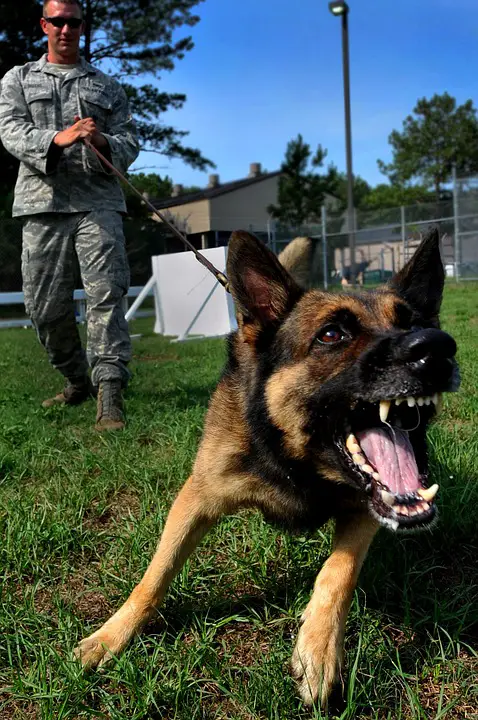Table of Contents
Barking is the way dogs communicate. Some dog owners like it when their dog barks because it helps alert them about approaching people and emergencies. It also helps dog owners know if there is anything the dog wants or needs. In some cases, the Barking of dogs can be excessive and annoying. Keep in mind that Barking serves different functions. It is crucial to identify the cause of your dog’s Barking before you can treat the barking problem. Why does my dog bark at everyone? There are different types of Barking, which serves a distinct function for your dog. If he is rewarded for Barking, he will begin to think of this behavior as a way to get what they want. He will be using Barking to his benefit. As an example, dogs who seek attention will bark to get the things they want, such as food, playtime, and exercise. Because of this, it is crucial to train your dog when to bark and when to be quiet on command to mitigate attention-getting Barking. Instead, train your dog to perform another behavior such as sitting down to get rewarded.
Different Types of Barking

Protecting the territory
Dogs might bark excessively in reaction to people, dogs, and other pets who are near their territory. Your dog regards the surrounding area in your home as their territory. They might also think of places they have explored or strongly associated with you as a territory as well, such as your car, yard, and other places where you typically take them for a walk.
Barking to sound the alarm
Your dog will bark at every noise they hear, whether it is a threat or not. In this case, they might be barking to alert you. Dogs who bark to sound the alarm will have a certain body language. They will look stiffer than dogs who are barking to greet someone. Your dog will be pouncing forward each time they bark. Alarm barking is distinct from territorial Barking since there will be sights or noises that are disturbing. They may also sound the alarm in any location, and not just within their territory.
Barking to seek attention
In some cases, dogs will bark at people as well as other animals to get attention. They want rewards such as food, playtime, and toys.
Barking to greet
There are also cases where your dog will be barking as a form of greeting. Dogs may bark if he sees people approaching or other dogs. In this case, you will observe that his body’s position is generally relaxed, and his tail will be wagging. Their Barking might also be accompanied by whining.
Compulsive Barking
There are times that your dog will bark excessively and repetitively, similar to a broken record. You might find that these dogs are moving in a repetitive manner as well. A compulsively barking dog might also be running back and forth in the yard or an area within his territory.
Socially Induced Barking
There are also times or dogs will bark when other dogs are barking. This barking behavior is socially facilitated when hearing other dogs even at a distance.
Barking Due to Frustration
Some dogs will bark endlessly when they are feeling frustrated. When they don’t have playmates or are confined in a small space or tied up in a leash, their movement is restricted.
Other Problems That Can Cause Barking – Why Does My Dog Bark at Everyone?

Illness or Injury
Why does my dog bark at everyone? Dogs will often bark to express pain or discomfort. Before treating your dog’s barking problem, make sure to have your dog examined by a vet to factor out medical issues.
Separation anxiety
Continuous Barking may be a result of separation anxiety. Thus, Barking occurs when the dog’s owner or caretaker is away, and the dog is left all alone. You will often see other symptoms of separation anxiety, such as destructive behavior and elimination.
Steps You Can Do About Your Dog’s Excessive Barking
It is crucial to know the type of bark your dog is exhibiting. It will help if you can identify which type of barking your dog is doing so you can resolve your dog’s problem. The following are questions that can guide you. Think carefully about the answers to these questions. It will help guide you on different types of Barking and proper solutions for it:
- In what conditions does the Barking occur?
- Who might be the target of the Barking?
- Are there objects, sounds, other dogs, humans who are triggering the Barking?
- What may be the reason your dog is barking?
Territorial Barking
Why does my dog bark at everyone? Your dog exhibits territorial behavior if they sense a threat. Defending the territory is a high priority for dogs. Many dogs will be driven to bark when they sense the approach of strangers or other animals near their territory. They might especially be sensitive to intruders in their home and yard. In this case, they are highly motivated to bark territorially. Your dog will even ignore reprimands or punishment, such as scolding or shouting. Although the barking may be mitigated by chastisement, your dog’s motivation to guard the territory remains strong. They might even attempt to defend the territory in other ways, such as biting.
Why dogs bark
Why does my dog bark at everyone? Dogs will bark to protect the territory and alert you to the presence of intruders or visitors. A dog will automatically bark when he sees people are coming at the door. Even the mailman who is delivering packages and mails might be barked at. Even the person reading the gas meter. Your dog will also react to the sights and sounds of humans and dogs passing by your territory. If your dog is in the car, your dog will get riled up when they see dogs and people passing by. Why does my dog bark at everyone?
You should observe your dog’s posture and behavior to know if there are engaging in territorial Barking or Barking to greet. Check their body language if they are saying “welcome” or “you’re not welcome at my place.” In the case of the former, it is crucial to train them to tone down their Barking. If you are dealing with a dog in the latter, it is crucial to limit their exposure to people and passersby. You must train them to associate strangers and visitors with good things such as rewards and attention.
Training
Why does my dog bark at everyone? To resolve territorial Barking, it is crucial to reduce the motivation of your dog as well as any opportunity to defend the territory. To manage this behavior of your dog, you will need to limit his ability to see people and other animals. You might want to apply a plastic film or glass coatings to limit your dog’s view of surrounding areas. You might want to put up opaque fencing to surround the perimeter of your house. Never allow your dog to come at the door and greet people. Don’t allow them to cross beyond the boundary line. Instead, train your dog to retreat to a location such as a crate or a mat and remain quiet until they are given a signal to greet newcomers appropriately.
Alarm barking
Why does my dog bark at everyone? A dog engaged in alarm barking will exhibit similar characteristics to territorial Barking. Sights and sounds trigger both. However, alarm barking is a response to sensory triggers that startle or upset your dog, especially when they are not in a familiar setting. An example is your dog will bark territorially if they sense strangers approaching. They will often do this when they are in their own home. In contrast, a dog who engages in alarm barking might vocalize their distress when they see threats. Territorial barking and alarm barking are dissimilar, they can be resolved using the same intervention.
Training your dog to calm down and be quiet
In case your dog continuously alarm barks or barks territorially despite your best efforts to mitigate their exposure to sights and sounds, you may want to try the following training techniques:
Allow your dog to bark at people coming to the door or passersby until you give them the signal to stop.
You might want to teach them the command: quiet. Let your dog bark 3 to 4 times. Afterward, say quiet. Make sure you don’t shout. Just say the command clearly and authoritatively. Then approach your dog and gently hold their muzzle close to your hand and repeat the word quiet. After this, release your dog’s muzzle and move away. Tell them to move away from the door. Then command your dog to sit and offer them a reward. If they stay and remain quiet, continue giving rewards in the next several minutes. Do this until whatever caused his Barking is gone. If your dog starts barking right away, repeat the method discussed. Apply the same training outdoors if he barks at innocent passersby or when they are playing in the yard.
Other training options
If you do not want to hold the muzzle of your dog, especially if it seems to scare your dog, you can try a different option. Once your dog barks, calmly approach them and say quiet. Reinforce silence by offering him a steady stream of treats such as hot dogs, pieces of cheese, and chicken.
After several repetitions of this sequence over a few days, your dog will begin to learn what the word quiet means. You will know that they are learning if they stop barking when they hear you utter the word quiet. At this point, you can gradually extend the period between uttering the cue word and offering the treat. As an example, you may want to say quiet and then wait two seconds. Afterward, you can give your dog a treat. After many repetitions, increase the spacing of treats from several seconds to minutes, and so on.
What to do if training your dog is ineffective
If you find that this procedure doesn’t elicit the desired behavior after 10 to 20 attempts, then allow your dog to bark up to four times and then calmly utter the word quiet. Afterward, make a distressing noise by shaking keys, bells, or a soda can filled with pennies. If you find your dog is startled by the sound, he will immediately start barking. The moment he does, make sure to calmly ask them to move away from the door or window.
Command him to sit and offer him a treat. If your dog stays quiet, continue offering the treats for the next several minutes until the sensory trigger that caused the barking is gone. When your dog barks right away, repeat the method discussed. If this training still doesn’t work after 20 attempts, you might want to seek a professional trainer’s help.
Anti-Bark Collars
There are several devices created to train dogs to stop barking. In most cases, these are collars that produce an unpleasant stimulus once your dog starts barking. It may be a loud noise, an ultrasonic sound, or even a spray of bitter citronella. In some cases, collars will deliver a small electric shock. Please do not attempt to use collars that use noise as a deterrent since it is ineffective with most dogs. According to reviews and experience of dog owners, citronella collars are effective in mitigating Barking. It is also viewed as more humane by owners.
Overall, every dog will become collar wise. Meaning they will never bark when they know they are wearing an anti-bark collar. However, they might bark once the collar is removed. Collars that utilize a record system to react to the sound of a dog’s Barking should not be used in a home with multiple dogs since any bark might trigger the collar and activate it. Why does my dog bark at everyone?
Keep in mind that anti-bark collars are devices designed for punishment. It is not recommended as a first choice when resolving barking problems. It is especially true for Barking that is driven by fear and anxiety. Prior to using an anti-bark collar, make sure to consult with your vet so you can rule out medical issues your dog could be suffering from.
Final Thoughts – Why Does My Dog Bark at Everyone?

You must train your dog to bark only when it is appropriate. A barking dog might be intimidating and scary to harmless visitors and passersby. Plus, a dog who chronically barks is annoying not only to you but also to your neighborhood. Teach your dog proper behavior utilizing training methods that teach them habits that are more rewarding and satisfying.
